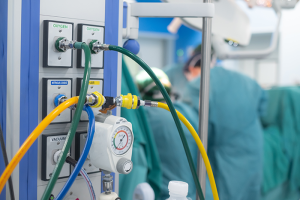Supply chains leverage tech to integrate with bundled and other payment methods

Cardinal Health’s cloud-based inventory solution allows clinicians to scan items as they use them, ensuring billing and clinical documentation accuracy.
Cardinal Health is working with hospitals through its inventory management solution to create more visibility on how medical devices flow through the supply chain, explains Jean-Claude Saghbini, vice president of inventory management solutions for Cardinal Health.

|
2017 Trends: Materials management |
| Previous: Next-gen supply chains |
| Next: Traveling across the continuum |
|
|
Cardinal Health is expanding its cloud-based platform that allows hospitals to continually monitor inventory. The platform is tied to radio-frequency identification (RFID) tags on each product, and smart shelves and cabinets for storing high-value medical devices. The system issues alerts when products expire or are out of stock. The platform allows for a reduction of inventory of between 20 and 25 percent, and an annual return on investment of between 200 and 300 percent, Saghbini said. The cost return is based on reduced inventory and waste and increased revenue capture, he says.
“With new payment models, we are starting to look at standardization of product use,“ he says. “We can look across the entire network and at product variation. This allows providers to implement more standardization and measure the effect of those changes accurately."
Prominent among these new payment models is bundled payment, in which hospitals receive a single sum for an entire episode of care. In this environment, supply cost is a key to strategic success.
The relatively new ability to collect and rapidly analyze data is creating new opportunities for health systems to work together to source their supply chains, experts say.
One example is aptitude LLC, a wholly owned subsidiary of Vizient Inc. The Irving, Texas-based member-driven health care performance improvement company, launched aptitude in 2013 as the first online direct contracting market. The platform matches providers with suppliers to complete rapid contracts in everything from hip replacement parts to surgical gloves.
For instance, the Independent Hospital Network Sourcing Group, comprising 20 member hospitals in Ohio, Indiana and Michigan, used the aptitude platform to execute a contract for diapers for its members in 29 days, at a projected savings of more than $145,000, or 45 percent of the total annual spend.
Now, aptitude is seeking to add new flexibility to the model, says Troy Kirchenbauer, general manager at aptitude. “Rather than going into the market seeking a product in a predefined way, providers can customize their preferences,” Kirchenbauer says.
With the changes to payment models, aptitude is building on its success to further customize its marketplace. So, a provider that is taking on risk with a payer in a bundled knee-replacement program can go to the market seeking a supplier willing to work within the confines of that risk model, Kirchenbauer explains.
“It allows them to create unique financial models to do shared risk for shared financial rewards, like credits,” Kirchenbauer says. So, if a supplier had a product that aims to help reduce the length of a patient's hospital stay, that product could be included in the risk-based contract. Product performance within these contracts is being monitored by aptitude, and that data could become valuable in near-future efforts to advance the field of comparative effectiveness.
The company has submitted a patent that essentially would allow it to crowdsource comparative effectiveness. The idea is that a product's effectiveness can be determined by whether a provider continues to renew its purchase agreement on it. Armed with this data, aptitude could have an advanced model of clinical effectiveness outside of traditional clinical trials, Kirchenbauer says. Similarly, a company called Flatiron Health is crowdsourcing data from electronic health records on oncology treatments from patients across the country to provide more real-time data on cancer drug use and effectiveness outside of traditional clinical trials.




